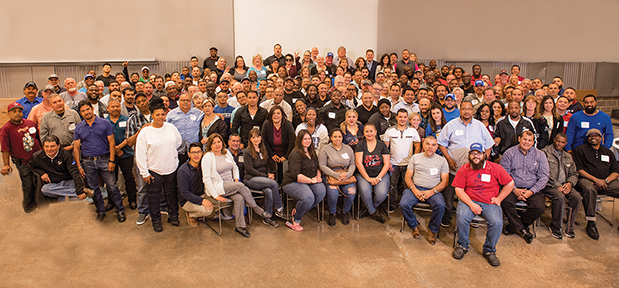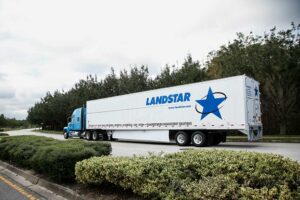Diversity, equity, and inclusion (DEI) has become a common catchphrase in American culture, but what exactly what does it mean and why is it important for employers?
“Diversity is the understanding and acknowledgement of the differences we all bring to the table, whether it’s gender, ethnicity, sexual orientation, or religious beliefs — all the things that create our various differences,” said LaQuenta Jacobs, a human-resources professional with more than 20 years of experience. “It is bringing those to the table and managing those into the organizational culture in a way that drives inclusion, where people feel as if they ‘belong’ in an organization (and that) they’re valued for their differences.”
Jacobs, who joined XPO Logistics in 2018 as head of resources for the last-mile unit, became the company’s first chief diversity officer in August 2020. Prior to XPO, Jacobs championed inclusivity in senior human-resources roles with Delta Air Lines, The Home Depot, Turner Broadcasting Systems, and Georgia-Pacific Corp., among others.
While race and gender are the most obvious facets of diversity, Jacobs noted that the term also applies to a person’s religious beliefs, socioeconomic status, and sexual orientation. Other groups under the “diversity” umbrella include military veterans, people with physical or mental disabilities, and others.
Practicing diversity, equity, and inclusion in business does not mean offering a job or promotion to a person simply because he or she fits a certain profile, Jacobs stressed. Instead, it’s a matter of ensuring that each open position is properly posted and that all qualified applicants receive equal consideration — and then hiring the most qualified candidate, regardless of race, gender, religion, etc.
“Diversity, equity, and inclusion is not a ‘check the box’ exercise, and it’s not a game of quotas, because numbers only take us so far,” explained Jacobs. “It is extremely important in companies, specifically in (the trucking and logistics) industry, to promote an inclusive workforce and build a culture that fosters innovation, higher employee engagement, and leading in your industry.”
For business leader, author, trainer, and speaker Brian Fielkow, who serves as CEO of Jetco Delivery and executive vice president of the GTI Group, creating a culture of diversity, equity, and inclusion is vital to a company’s success. During his 25-plus years in the trucking industry, Fielkow said he has gained valuable insights by working with diverse groups of people, learning about their experiences, and hearing their opinions.
Like many trucking companies, Fielkow said, Jetco has struggled with driver turnover and employee morale issues, adding that having a diverse group of employees has helped the company better solve those problems.
“Several years ago, we asked our drivers to elect a driver committee,” he shared. “The committee is meaningfully engaged in our decision-making and brought much greater diversity to the table.”

Fielkow said forming this diverse committee has helped Jetco attract and retain the best drivers, create opportunities for those drivers, and proactively address drivers’ concerns.
“Diversity in thinking, which results only from a broad range of experiences and backgrounds, is critical for ensuring continuous improvement. Individuals and businesses work smarter and grow faster with diversity at the table,” he explained. “I have been around companies that were like country clubs; it’s not a healthy, productive environment when the workplace is homogenous, and you have ‘group think.’ You need diverse voices that stem from a broad range of experiences to challenge norms and ideas to continually push your organization.”
Gaining a reputation as a company that fosters diversity, equity, and inclusion is also an important step in attracting top-quality employees. Jacobs noted that, according to CNN Money and other sources, 76% of job seekers say they want to work for a company that offers a diverse, inclusive culture.
“That’s huge, for 76% of the pipeline to want to know that the organization is going to value them for the diverse and inclusiveness that they bring to the table,” said Jacobs.
Both Jacobs and Fielkow stress that, regardless of the industry, having employees from varying backgrounds and who have differing points of view can help a company grow, develop creative and innovative solutions, and better connect with a diverse client base.
“By sharing differences — differences of opinions, backgrounds, experiences — we can better understand each other,” added Fielkow. “Once we have that understanding, we are more comfortable discussing, challenging each other, agreeing and/or disagreeing with each other. That understanding enables us to be on the same page and a united front once we leave the room, regardless of whether we agreed or disagreed behind closed doors.”
Fostering a culture of diversity, equity, and inclusion is not something that happens overnight, Jacobs noted; rather it takes three to five years of research and planning. The first step is to assess your company’s culture.
“You’ve got to have a road map. You need to understand where you are, so you know where you’re going,” she explained. “Most DEI programs fail because they don’t have a clear objective.”
Linda Garner-Bunch has been in publishing for more than 30 years. You name it, Linda has written about it. She has served as an editor for a group of national do-it-yourself publications and has coordinated the real estate section of Arkansas’ only statewide newspaper, in addition to working on a variety of niche publications ranging from bridal magazines to high-school sports previews and everything in between. She is also an experienced photographer and copy editor who enjoys telling the stories of the “Knights of the Highway,” as she calls our nation’s truck drivers.








